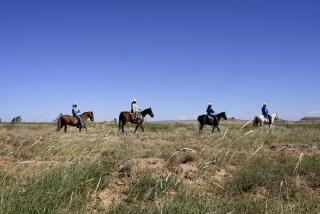Tribe Seeks Dismissal of Campaign Finance Suit
- Share via
SACRAMENTO — One of California’s wealthiest and most influential Indian tribes tried to persuade a judge Wednesday to dismiss a lawsuit by the state’s political watchdog agency that accuses it of campaign finance violations.
“Until and unless Congress acts, certainly this court should not” act to make the Agua Caliente band of Cahuilla Indians submit to the state’s campaign finance regulations, said Art Bunce, an attorney for the tribe.
“The right of a state government to protect its election system is at issue,” responded Charity Kenyon, attorney for the state Fair Political Practices Commission. “California does not have to go to Congress to get that protection for its government.”
The case is apparently the first test in the nation on whether Indian tribes, whose unique sovereignty exempts them from much state control, are bound by the same rules that govern other political contributors to state governments.
The case is viewed by experts as potentially precedent-setting and is being closely tracked by political watchdog groups. Those groups worry that a victory by the tribes, increasingly among the state’s top political contributors, would upend the state’s campaign finance laws.
The Fair Political Practices Commission alleges that the Agua Caliente band was late in disclosing more than $8 million in donations to candidates and causes between 1998 and 2002.
The Agua Caliente band, which has about 300 members and operates two casinos in and near Palm Springs, has argued that because of its tribal sovereignty it is not bound by the state’s campaign rules and that the state does not have the right to sue it to enforce them.
The Fair Political Practices Commission argues that the state has its own sovereign right to uphold its election systems.
Sacramento Superior Court Judge Loren McMaster questioned both sides in detail during about 1 1/2 hours of arguments and said he would take the matter under advisement and issue a ruling at a later date.
Bunce said that although the tribe refused to submit to commission rules, it was open to reporting its donations under alternative methods.
He proposed a government-to-government agreement with the commission similar to the tribal-state compacts that regulate gaming.
More to Read
Get the L.A. Times Politics newsletter
Deeply reported insights into legislation, politics and policy from Sacramento, Washington and beyond. In your inbox twice per week.
You may occasionally receive promotional content from the Los Angeles Times.









